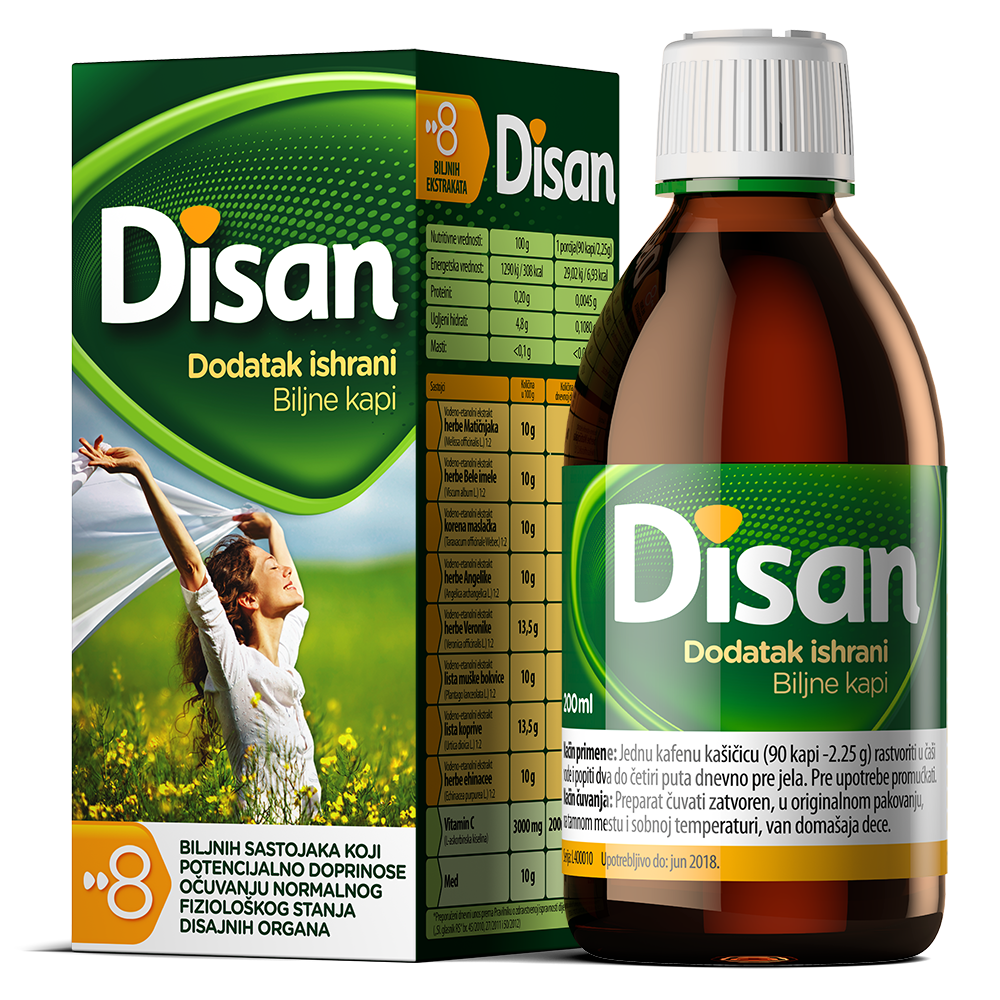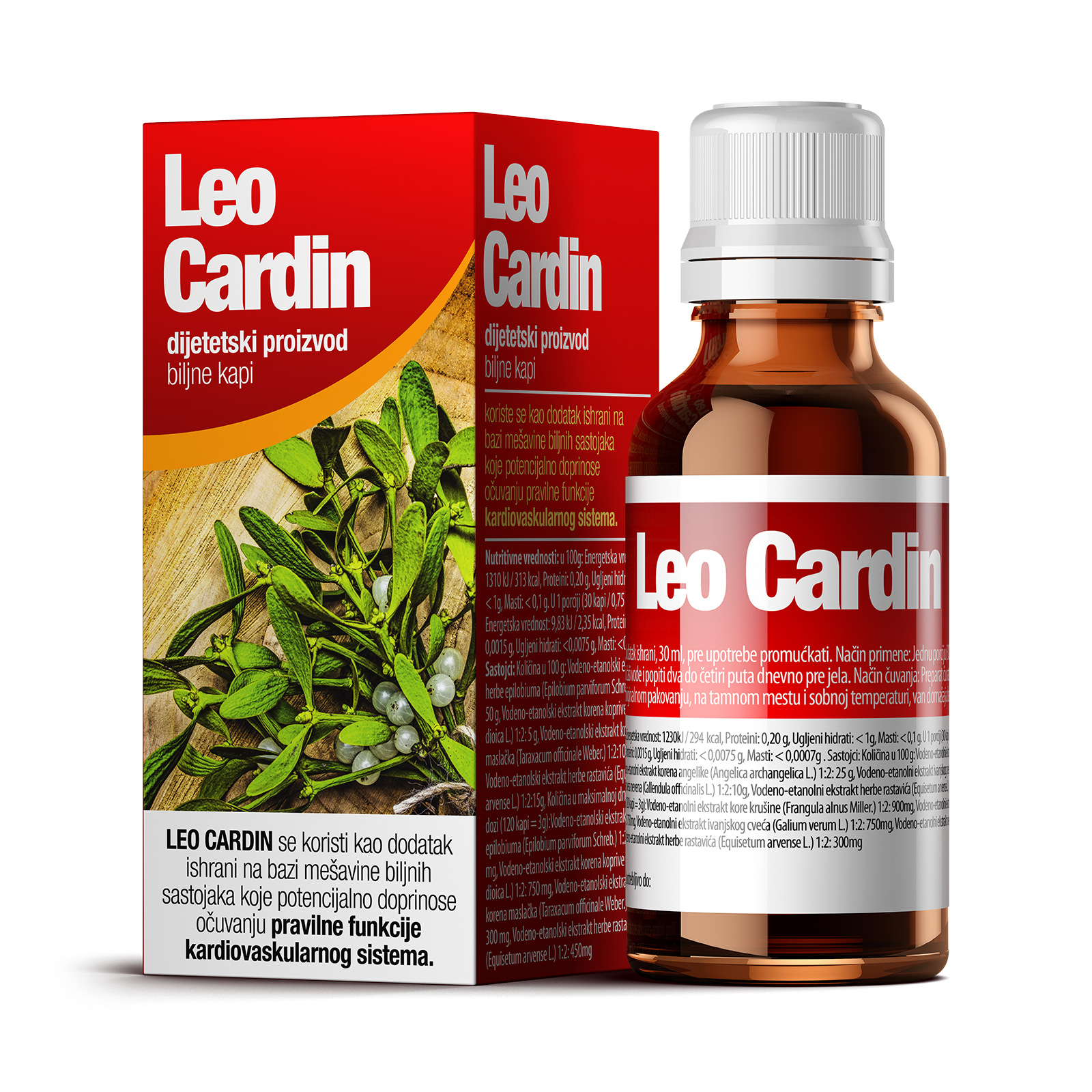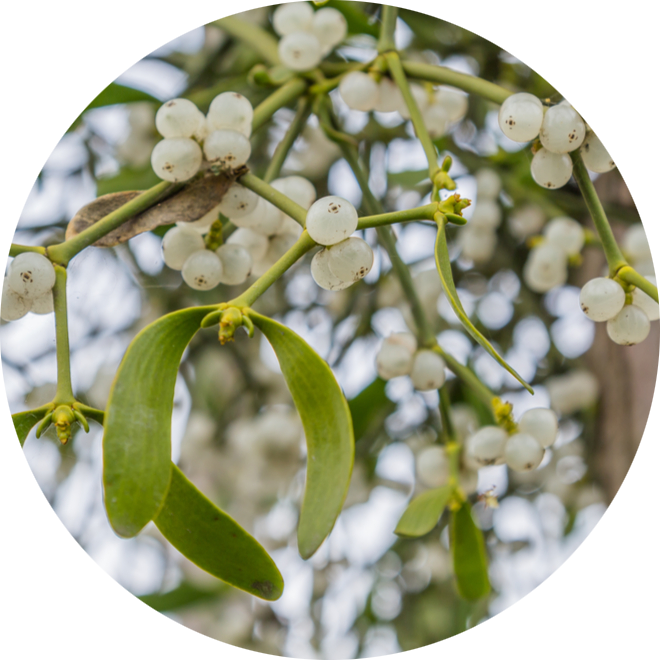(Visci albi herba)
If we were to draw up a list of the most powerful plants, it would certainly be topped by mistletoe. Our ancestors glorified it since time immemorial and ascribed to it magic powers; modern science has proved that the magic is real. Mistletoe is strange in itself – it does not have a root, it grows as a parasite on trees and feeds on them. For mistletoe to come into being, a bird needs to eat its ripe berry; after eating the white flesh of the berry, the bird has to wipe its beak on twigs and branches, leaving behind the seed. Once the sticky content is dried and hardened, the firmly attached seeds germinate, stealing nutrients and water from their host.
We can spot it easily, on leafless tree crowns of deciduous trees in wintertime as mistletoe is still green. Its fruit is very poisonous, but the plant itself – if prepared professionally – has such potent therapeutic properties that it even has the power to destroy cancer cells. It is interesting that the therapeutic power of mistletoe depends on what tree it lives on: it has medicinal properties if it grows on the apple, pear and plum trees, not on conifers, willow, oak and linden trees.
MISTLETOE, THERAPEUTIC PROPERTIES
What scientific research has established is that mistletoe, known by its scientific name Visci albi, stimulates our immune response at the cellular level and that it selectively attacks and destroys cancer cells, i.e. it acts as a cytostatic. That is why it is used officially in many hospitals as a therapy for malign diseases and precancerous conditions. A study has shown that mistletoe is a very useful adjunct therapy for the treatment of breast cancer. What makes it possible are mistletoe’s viscotoxins, cardiotonic polypeptide and lecithins which have an impact on granulocytes which destroy pathogenic cells. Standard anticancer treatment destroys granulocytes and thereby the immune system of the patient. Unlike the standard therapy, mistletoe eliminates cancerous cells, but at the same time it protects and strengthens immunity and prevents inflammation. Mistletoe and cancer do not go hand in hand.
In addition to suppressing malignant cells, mistletoe has the power to:
- regulate blood circulation, blood pressure and prevent arrhythmia
- prevent dizziness and cramps
- regulate hormones
- improve metabolism and digestion, to prevent constipation
- normalise the secretion of glands
- prevent diabetes
- accelerates the work of the lymphatic system
- eliminate hot flashes and irritability to have a beneficial effect on the glands with internal secretion
Mistletoe has a wide range of effects: it is a natural vasodilator – it widens the arteries which results in blood flowing more easily through vessels. That is why it is excellent for cardiovascular diseases used both therapeutically and prophylactically. Mistletoe lowers blood pressure, it has a soothing effect on the heart muscle and helps flush excess water from the body. This magical plant calms cramps, aides wound healing and stops bleeding, stimulates healthy digestion, flushes out intestinal parasites, balances the hormones and helps with diabetes. As an efficient diuretic it can help with inflammation, rheumatism, arthritis and gout. It is the protector of the female reproductive system and strengthens both female and male fertility – in women it regulates periods and in men it helps with erectile disfunction.
MISTLETOE AS MEDICINE AND PREVENTION
Numerous studies have confirmed mistletoe’s powerful anti-viral properties; with the emergence of the SARS-CoV-2 virus, mistletoe has taken centre stage again. It is mostly used in China to inhibit 3CVLpro, the main protein that helps the virus spread in the host’s body. In addition to its proven inhibitory function, it plays the most important role by protecting the most vulnerable people, those most at risk from Covid-19 – the people with existing co-morbidities, heart patients and diabetics in particular. This is where mistletoe’s effect on the glands with internal secretion and the cardiovascular system is precious.
FOR CLEAR LUNGS
Mistletoe is the biggest protector of the weak and the infirm, a true Robin Hood among the plants. It strengthens our immunity, helps the body to fend off external enemies, but also to restore balance in our body. Scientists have even proven the effectiveness of this medicinal plant in combating recurrent respiratory infections in children as a result of the Chernobyl nuclear accident. Significantly stronger immunity was observed in children after therapy.
While it is ready to help us with the common cold, it can also provide help with the most complicated diseases of the respiratory tract. It is also very helpful in pneumothorax – air in the lung tissue that causes lung collapse, which is a common problem in elderly patients, and is a useful adjunct therapy in the treatment of lung cancer.
MISTLETOE, EXPERIENCES IN MENOPAUSE
A study involving animals showed that mistletoe effectively reduces hot flashes and also contributes to maintaining muscle mass and preserving the health of vital organs in menopause. This plant contributes to a healthy metabolism of fat and stabilises insulin levels, which is very important for women who are entering menopause because we know that during this period, when they lose the protective effect of oestrogen, they are especially prone to fat deposition in the abdomen, to loss of muscle and bone mass, diabetes and osteoporosis. Mistletoe has been proven to inhibit the growth of osteoclasts, cells that break down and resorb bone. In addition, in rheumatism mistletoe relieves pain and helps with joint aches that often accompany menopause.
Apart from preventing osteoporosis, research has shown that mistletoe has another superpower: one study looked into the negative impact of a high-salt diet on the heart rate, blood pressure, blood vessels and kidneys and associated disorders. However, mistletoe has been shown to completely eliminate the harmful effects of salt and to establish a healthy body weight, while protecting organs and blood vessels from damage. It maintains the stability of red blood cells and leukocytes in the blood and works against high blood pressure. As menopausal women are much more susceptible to cardiovascular disorders, prevention with mistletoe is the best investment in healthy and carefree old age. With its anti-tumour action, it will prevent the development of malignant cells and the formation of tumours in the breasts and gynecologic anatomy, or help in the treatment of tumours.
MISTLETOE INFUSION OR DROPS?
What is very important to bear in mind is not to use it if not prepared by the experts. Mistletoe infusion must be taken over a short period of time with breaks; therefore, mistletoe drops are always a better solution, obviously if made by reputable producers.
As all other medicinal plants, mistletoe works best if it joins forces with other plants. This powerful synergy of mistletoe with other plants is found in Disan – a natural bio-elixir which strengthens our immunity and protects our vitality and health. In addition to mistletoe, Disan contains broadleaf plantain, echinacea, nettle, lemon balm, angelica, heath speedwell and dandelion, together with honey and vitamin C. In addition to helping us fight off viruses, Disan will protect our respiratory tract, it will cleanse our lungs, soothe or calm coughs, stimulate circulation and micro-circulation, cleanse our blood vessels, but also calm and relax us. This is why Disan can also help smokers give up smoking.
Agitation, palpitations, mood swings, insomnia, irritability and hot flashes are symptoms that can be recognised by every woman entering menopause. Femisan B can help with such conditions. White mistletoe is one of the five plants that are an integral part of this valuable preparation, along with yarrow, lemon balm, marigold and valerian. Not only will Femisan B soothe the unpleasant symptoms of menopause, but it will also act preventively in disorders that often occur in the transition period. Just as it calms the heart as part of Femisan B, mistletoe also helps in Leocardin: it tones the heart muscle, regulates blood pressure, prevents arrhythmia and improves circulation.



